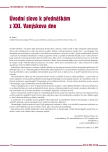-
Medical journals
- Career
Anticoagulant treatment of deep vein thrombosis in ambulatory practice
Authors: D. Karetová
Authors‘ workplace: II. interní klinika kardiologie a angiologie 1. lékařské fakulty UK a VFN, Praha, přednosta prof. MUDr. Michael Aschermann, DrSc., FESC
Published in: Vnitř Lék 2005; 91(7 a 8): 790-794
Category: 128th Internal Medicine Day - 21rd Vanysek's Day Brno 2005
Overview
A classical anticoagulation therapy in acute phases of venous thromboses is especially based on low-molecular weight heparin (LMWH) administration today. Treatment with non-fractionated heparin is indicated only exclusively, in particular in situations where the increased risk of bleeding or the necessity of performing surgery or other intervention is being expected. LMWH administration resulted in general improvement of the care for patients with deep vein thromboses. We reach an efficient therapy in most patients without necessity of laboratory monitoring, only with dosage depending on patient's body weight. Subcutaneous administration 1-times or 2-times daily is simple and more comfortable for patients compared to continual infusion. Some defined cases of deep vein thromboses are indicated to administration of thrombolytic treatment (younger patients with the first attack of ileofemoral thrombosis without significant associated diseases). In rare cases of contraindications of anticoagulant (and concurrently thrombolytic) treatment it is possible to consider surgical thrombectomy in the case of recent thrombosis, however low-molecular weight heparins are currently the basis of treatment in most patients. A finding that walk does not increase the risk of pulmonary embolism occurrence and simultaneously leads to faster oedema and pain regression enabled treatment transfer of the part of non-complicated patients to the ambulatory scope.
Key words:
thromboembolic disease – low-molecular weight heparin – ambulatory treatment of thromboses
Sources
1. Levine MN, Hirsh J, Gent M et al. A randomized trial comparing activated thromboplastin time with heparin assay in patients with acute venous thromboembolism requiring large daily doses of heparin. Arch Intern Med 1994; 154 : 49–56.
2. Simonneau G, Charbonnier B, Decousus H et al. Subcutaneous low molecular weight heparin compared with continuous intravenous unfractionated heparin in the initial treatment proximal vein thrombosis. Arch Intern Med 1993 : 153 : 1541–1546.
3. Lensing AWA, Prins MH, Davidson BL et al. Treatment of deep venous thrombosis with low-molecular-weight heparins. Arch Intern Med 1995; 155 : 601–607.
4. Gould MK, Dembitzer AD, Doyle RL et al. Low molecular weight heparin compared with unfractionated heparin for the treatment of acute deep vein thrombosis: a meta-analysis of randomised controlled trials. Ann Intern Med 1999; 130 : 800–809.
5. Schraibman IG, Mine AA, Royle EM. Home versus in-patient treatment for deep vein thrombosis. Cochrane Database Syst Rev 2001; 2: CD003076.
6. Anschwanden M, Labs KH, Engel H et al. Acute deep vein thrombosis: early mobilization does not increase the frequency of pulmonary embolism. Thromb Haemost 2001; 85 : 42–46.
7. Schellong SM, Schwarz TH, Krapp J et al. Bed rest in deep vein thrombosis and the incidence of scintigraphic pulmonary embolism. Thromb Haemost 1999; 82 : 127–129.
8. Blattler W, Partsch H. Leg compression and ambulation is better than bed rest for the traetment of acute deep venous thrombosis. Int Angiol 2003; 22 : 393–400.
9. Crowther MA, Ginsberg JS, Hirsh J. Practical Aspects of Anticoagulant Therapy. From Hemostasis and Thrombosis. New York: Williams and Wilkins 2001 : 1497–1517.
10. Ginsberg JS, Hirsh J Treatment of Venous Thromboembolism. From Hemostasis and Thrombosis. New York: Williams and Wilkins 2001 : 1405–1413.
11. Hirsh J, Anand SS, Halperin JL et al. Guide to Anticoagulant Therapy: Heparin. Circulation 2001, 103 : 2994–3018.
12. Hirsh J. Low-molecular weight heparin for the treatment of venous thromboembolism. Am Heart J 1998, 135: S336–S342.
Labels
Diabetology Endocrinology Internal medicine
Article was published inInternal Medicine

2005 Issue 7 a 8-
All articles in this issue
- Retrospectives and perspectives of current haematology
- Primary antithrombotic prevention of venous thrombosis in internal medicine
- Anticoagulant treatment of deep vein thrombosis in ambulatory practice
- Invasive controlled treatment of deep venous thrombosis
- Platelet membrane glycoprotein IIb/IIIa in the view of its genetic changes
- Thrombocytopenic purpuras
- Thrombocytosis and thrombocythemia
- Antithrombotic therapy in the etiology of an acute posthaemorrhagic anaemia
- Anemia of chronic disease
- Autoimmune haemolytic anaemias
- Rare forms of hereditary anaemia in the Czech and Slovak populations - β- and δβ-thalassaemia and unstable haemoglobin variants
- Assuring reliability of blood count examinations
- Phenotype and genotype analysis of hereditary hypofibrinogenaemia and dysfibrinogenaemia
- Antiphospholipid syndrome – diagnosis and treatment
- Thrombophilia
- Antiaggregant therapy
- Platelet membrane glycoproteins from the point of view of their genetic changes
- Platelet membrane glycoproteins from the point of view of their genetic changes
- Haemotherapy and its safety
- Post transfusion reactions
- Refractoriness to platelet transfusion
- Haemovigilance
- Internal Medicine
- Journal archive
- Current issue
- Online only
- About the journal
Most read in this issue- Post transfusion reactions
- Thrombocytosis and thrombocythemia
- Antiphospholipid syndrome – diagnosis and treatment
- Antiaggregant therapy
Login#ADS_BOTTOM_SCRIPTS#Forgotten passwordEnter the email address that you registered with. We will send you instructions on how to set a new password.
- Career

